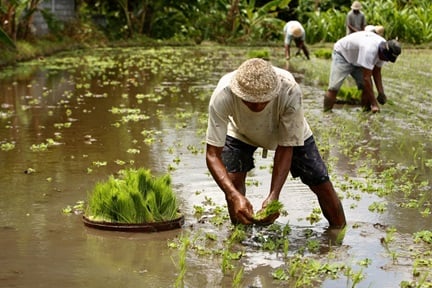The impact of technology, consumer behaviour and purchasing capacity on African retail
Africa is beginning the see the emergence of a middle-class that wants to shop in malls. But technology and consumer behaviour are not the only factors that will change the face of retail here.
by Johan Burger

CARREFOUR GROWING ITS FOOTPRINT IN EAST AFRICA
Carrefour Kenya recently exploited the withdrawal from Kenya by Shoprite by taking up Shoprite's premises at the Westgate Mall in Nairobi. Carrefour stepped up competition for customers with rivals such as Naivas that also have a presence in the area. It will use this new store to target the residents of Westlands, Parklands and the larger Thigiri area. Retailers currently underserve these areas. Carrefour also recently took up space at Centrepoint Mall in Diani, recently vacated by Nakumatt Holdings. The French chain now has 12 branches in Kenya.
While competitors such as Shoprite plan to exit Kenya due to what they describe as poor business, Carrefour expands its presence in the country. In addition to Shoprite, Choppies Supermarket, with roots in Botswana, has already exited the Kenyan market.[1]
The Carrefour expansion drive is not only in Kenya. The chain recently opened its second store in Uganda's capital Kampala. As in Nairobi, Carrefour's new store takes up space previously occupied by Nakumatt Holdings and Shoprite at Metroplex Shopping Mall in Naalya. According to Carrefour, the new supermarket will serve shoppers living and working in Naalya, Ntinda, Namugongo and the vicinities. Besides offering a wide range of products, the new store would uplift the surrounding community by creating direct and indirect employment opportunities for over 90 Ugandans.[2]
While other retail chains such as Shoprite, Choppies and Nakumatt struggled and withdrew from Kenya, Carrefour announced a 30.2% growth in sales from Sh19.4 billion (±US$176.7 million) in 2019 to Sh25.3 billion (±US$230.5 million) in 2020 from its Kenyan outlets last year amid its expansion drive.
Majid Al Futtaim, the Carrefour franchise holder in Kenya, ascribed its success to its aggressive expansion bid across major towns in Kenya and a focus on online shopping.
Carrefour is now the only major foreign-owned large-scale retailer in Kenya. It intends to continue expanding its retail business in Kenya with a focus on online shopping in 2021.[3]
POINT OF INTEREST
- While African-based retail companies such as Choppies, Shoprite and Nakumatt struggle to succeed in Kenya and East Africa, Carrefour not only established a footprint but is quite successful. While Carrefour is a French company, franchise holder Majid Al Futtaim (MAF) from the UAE owns the African-based branches. It would be fascinating to understand how a French brand operated by a UAE franchise holder can be more successful on a continent where local retailers struggle to survive. Perhaps the entry of Carrefour into Kenya led to Shoprite deciding to enter that country. However, Shoprite recently exited from Kenya, with Carrefour taking over its store space in Nairobi. With other major retailers departing from Kenya, Carrefour effectively becomes the default choice for consumers, thus enhancing Carrefour's prospects for success. This momentum becomes a self-fulfilling prophecy for Carrefour, a kind of flywheel effect. MAF has a presence beyond East Africa with its significant presence in Egypt.
RETAIL DIVERSIFICATION IN SOUTH AFRICA
South Africa's Mr Price Group announced on 15 March 2021 its agreement to purchase from homeware retailer Yuppiechef its seven physical stores and online business. Yuppiechef started as an online retailer in 2006 and expanded into physical stores in 2017. It sees 70% of its turnover from e-commerce.
Mr Price saw the acquisition as an opportunity to get access to a higher customer segment, which would enable the growth of its share-of-wallet through aspirational value spending. It would also give Mr Price more potential for growth in online retail. It would get an additional platform to "grow their ambitions in online retail and enable them to be strategically positioned for further growth."
Yuppiechef saw the acquisition as an opportunity to "grow with a partner who has a shared vision and the resources to help achieve this." However, regulatory approval for the deal is still pending.[4]
In addition to acquiring Yuppiechef, Mr Price announced in November 2020 its acquisition of the value fashion retailer Power Fashion. The deal will come into effect in April 2021 to align with the group's 2022 financial year. While the Power Fashion brand is not well-known, the chain performed impressively over time and has 170 stores across Southern Africa, including Lesotho and Swaziland. Power Fashion clothing prices are reportedly significantly lower than Mr Price's. The transaction cost will be 4% of Mr Price's market capitalisation.
Power Fashion is reportedly an existing business with attractive scale and significant growth opportunities, available at a reasonable acquisition price. Mr Price did not intend to convert the Power Fashion stores into Mr Price stores as they believed there was no reason to mess with a successful model. The existing management is to continue running the company.[5]
POINT OF INTEREST
- South Africa's Mr Price was traditionally a low-cost clothing seller and later diversified into sport and homewares. It managed to develop a strong brand name in the country and expanded into the international arena, including Australia. Unfortunately, Mr Price exited Australia after attempting to move from an online to a physical presence. The firm also entered Poland in 2018, then withdrew in 2019. Mr Price also withdrew from Nigeria in 2020. This sets the scene for its recent acquisition of Yuppiechef and Power Fashion. Mr Price now seems to realise that success in the South African market did not translate into success elsewhere. Its sources of competitive advantage in South Africa were not necessarily valid abroad. It makes sense for them to diversify by acquiring successful companies in a familiar market.
JUMIA'S SEESAW PERFORMANCE
The Nigerian e-commerce platform Jumia operates in 11 African countries. Jumia recorded a gross operating surplus of US$139.6 million in 2020, down 13% from 2019. This result reflects two strategic decisions. First, targeting the most promising markets and second, pulling back from high-margin technology products (smartphones and other equipment) to focus on lower-margin consumer products.
While Jumia now sells and earns less, the firm reportedly has better control over its journey to profitability. In 2020, it gained over 700,000 active customers, an increase of 12% to 6.8 million, and reduced its losses to US$149 million from US$228 million. Before general and administrative costs, the company now breaks even in most of the countries in which it operates. It reduced its advertising budget by 42% over the prior year.
According to Julien Garcier, head of consulting firm Sagaci Research, the results show that Jumia fails to benefit from the Covid-19 pandemic despite its leadership position, in contrast to Amazon in the US and Europe, or Alibaba in Asia. This result suggests that the platform has yet to find an e-commerce model that works for Africa. Garcier also questioned Jumia's shift towards consumer products.
When UberEats recently exited Egypt, Jumia launched Jumia Food in that market. It also announced plans to enter the DRC, Ethiopia and Angola, three reportedly tricky markets. Jumia also intends to convert JumiaPay and Jumia Logistics into full-fledged companies. However, these services have yet to prove their relevance.
The number of JumiaPay transactions, the main Jumia payment option, fell by 14% in 2020. However, the application is also used to top up phone credit and pay for Jumia Food purchases. Jumia's total transaction volume of US$196 million (up 58%) remains a growth area for the group.[6]
POINT OF INTEREST
- Jumia, Africa's e-commerce giant, has struggled to become profitable for quite a while. It has had to exit from several countries and close down some subsidiaries to reduce its cost base and become profitable. Its inability to become profitable during the Covid-19 pandemic raises questions about the conditions it needs to generate profit. Jumia faces challenges that Amazon and Alibaba do not. Breaking even before general and administrative expenses is not a significant KPI. This figure means only that the company's cost of sales is less than its revenues, which is to be expected. It also suggests that the company must increase its scale without increasing its overheads. Jumia sees falling sales, apparently the result of its new strategy. While Amazon took a long time to become profitable, its market was dissimilar to that faced by Jumia. Africa's population is generally poor. How Jumia can change its business model to become profitable remains to be seen.
SHOPRITE PULLS OUT OF UGANDA, MADAGASCAR AND NIGERIA
One of Africa’s largest retail store, Shoprite has announced it intended to withdraw from the Uganda and Madagascar. The group ran ten stores in Madagascar and five in Uganda. The move comes weeks after Shoprite decided to exit Nigeria 15 years after it first entered the country. According to Peter Hirst, senior analyst at Euromonitor International, Shoprite’s decision to leave Uganda was driven currency devaluations, lower commodity prices, and high inflation which have caused household disposable incomes to drop. Ugandans have moved to online shopping and the Covid-19 pandemic has also hit retail chain sales. The firm reported ‘unfavourable market conditions’ for its decision and it was made despite its business still being profitable. It comes soon after the firm decided to quit another growing market - Kenya. Group CEO, Pieter Engelbrecht has blamed currency devaluations for his decision to reduce the firm’s footprint outside South Africa. He said the company has decided to maintain “minimum levels” of capital in Africa and manage costs “as best as possible”.[7] Shoprite, however, will continue its operations in Angola, Zambia and Mozambique.[8]
According to Piet Viljoen of Counterpoint Asset Management, some retail firms expand rapidly in Africa to chase growth, only to realise later on that it is a more difficult market to serve than originally envisaged. Another challenge is the difficulty associated with paying suppliers and expatriating profits and dividends. Nigeria as a market is a very tough place to operate, seemingly one that Shoprite did not fully understand.[9]
The group is now reportedly focusing stronger on its home turf, South Africa, where it has the dominant market share. It is still moving towards Angola, albeit in a more cautious manner. While its Angolan revenue declined by 16% (as measured in local currency Kwanza) and by 40% (as measured in South African Rand) in the six months through 27 December 2020, Shoprite is doing well overall. Business in South Africa which accounts for the bulk of the group’s income increased 5.6% during the same period.[10] Other South African retailers that have exit Nigeria include Truworths, Mr Price and Woolworths.
POINTS OF INTEREST
- It is interesting to note that while Shoprite has decided to scale back and other retailers in Africa such as Choppies (Botswana), Pick n Pay (South Africa), and Nakumatt and Uchumi (Kenya) are struggling to achieve success in the African retail environment others have entered the fray. Carrefour has established a footprint in Kenya and has recently also opened two supermarkets in Uganda.
- The world’s biggest cereal maker Kellogg established a meaningful presence in Nigeria by setting up a joint venture with Singapore’s Tolaram group. It acquired a 50% stake in Tolaram’s Nigerian food distribution subsidiary, Multipro, in 2015. Multipro has a network of over 1000 distributors spread across Nigeria. Through Multipro, the Tolaram Group also supports a network of privately run mini-marts under the brand name Best Choice. These are run as franchises. The popularity of Tolaram’s Indomie noodles, which are sold through the Multipro network, is a success story that defies belief. Through this joint venture Kellogg will also get access to Multipro's distribution network in Nigeria and Ghana, and potentially in the Democratic Republic of Congo (DRC), Ivory Coast, Cameroon and Ethiopia. This distribution network is what made Tolaram Africa Foods attractive to Kellogg.
- Tolaram clearly understands the challenges facing business in Africa and has its supply chains in place to make distribution less of a problem. It has learnt how to mitigate the risks in Africa and to make attractive returns. That is why it has become a partner of choice for Kellogg.
- Why is Africa such an attractive retail market? Africa’s growing consumer class provides retailers with a powerful incentive to expand into Africa. The African population is 1.3 billion strong and growing strongly. It also urbanising rapidly. Approximately 40% of Africans now live in and around cities. By 2030 Africa’s top 18 cities will have a combined spending power of $1.3trn. Few other markets outside Africa are as attractive.
PICK N PAY EXPANDS INTO AFRICA
While Shoprite is reducing its African footprint another South African retailer, Pick n Pay, is planning to do the opposite. Outgoing CEO Richard Brasher said Pick n Pay was exploring the opportunities to expand “in a measured way”. Outside its home turf, the retailer already does business in Zambia and Zimbabwe.
Head of Strategy and Corporate Affairs David North believes the expansion plan requires “a lean and low-cost model, which will cater to the majority of customers with a good value offer.”[11]
POINT OF INTEREST
- In addition to Zambia and Zimbabwe, Pick n Pay also had a retail presence in Tanzania, which it sold to Shoprite in 2002. It has traditionally been cautious about moving out of South Africa. Its “lean and low-cost model” for Africa is an interesting one. In South Africa, it is Shoprite that is considered to be a low-cost retailer while Pick n Pay caters to a more affluent consumer segment. Consumer purchasing power is even lower in the rest of SSA and certainly lower than Pick n Pay’s traditional market segment. Pick n Pay will have to streamline its supply chains to reduce its costs in order to cater to that kind of consumer market. Brand distinction will become important too. Position itself as a ‘low cost’ retailer overseas while retaining a ‘premium’ appeal at home could create cognitive dissonance and may end up hurting the brand in the long run.
LOCAL VERSUS FOREIGN COMPETITION
The retail sector in Kenya has been characterized by turbulence over the past few years. Local players Nakumatt, Tuskys and Uchumi have shut down while foreign entrants like Shoprite and Choppies have exited the market. French retail brand Carrefour, however, is an exception. It has been expanding its presence in the country, exploiting the space left vacant by competition. Also entering the race is local retailer Naivas, which will be opening three new supermarket stores in June 2021. This takes its footprint in Kenya to 74. The three new outlets will offer packed food, fresh vegetables, fast-moving consumer goods such as beverages, clothes, and electronics, amongst others. Naivas and Carrefour are investing heavily to fill the gap left open by retailers that have exited Kenya recently.[12]
POINTS OF INTEREST
- The Carrefour operation in Kenya is run by UAE’s Majid Al Futtaim Group. The group has operations in a number of countries in Africa. Majid Al Futtaim operates over 320 Carrefour stores in 16 countries, serving more than 750,000 customers daily and employing over 37,000 colleagues. It sources more than 80% of the products offered from the region. This enables the Group to streamline its supply chain and minimise costs.
- Naivas will struggle to compete against such a formidable competitor as Carrefour. The retail environment in Kenya is a difficult one to start off with. The average Kenyan shopper is cost-conscious and research shows many prefer to shop at informal markets. However, it is expected that an urbanizing and more affluent consumer market will eventually turn towards a more formal retail environment and prefer to shop at supermarkets like Carrefour and Naivas.
- Retailers have adopted different models for expansion in Africa - each with varying degrees of success. Shoprite has followed a greenfield expansion strategy while Pick n Pay prefers to rely on local partners to drive its African expansion. Carrefour is following a greenfield strategy as well. The jury is still out on which of these two models will be more successful and under what circumstances, if at all.
Additional Readings
Child, K. 2020. Mr Price makes its first big purchase in more than 20 years. Business Day. 26 November 2020. Available at https://www.businesslive.co.za/bd/companies/retail-and-consumer/2020-11-26-mr-price-makes-its-first-big-purchase-in-more-than-20-years/?utm_source=&utm_medium=email&utm_campaign=Ramaphosa+faces+first+no-confidence+motion+in+parliament+%7C+Mr+Price+makes+its+first+big+purchase+in+more+than+20+years+%7C+Kaap+Agri+to+pay+final+dividend+as+it+eyes+recovery&utm_term=http%3A%2F%2Fwww.businesslive.co.za%2Fbd%2Fcompanies%2Fretail-and-consumer%2F2020-11-26-mr-price-makes-its-first-big-purchase-in-more-than-20-years%2F. Accessed 17 March 2021.
Ellis, M. 2021. Mr Price announces deal to acquire Yuppiechef. Memeburn. 15 March 2021. Available at https://memeburn.com/2021/03/mr-price-announces-deal-to-acquire-yuppiechef/. Accessed 17 March 2021.
Ngugi, B. 2021. Carrefour defies Covid to record Sh25bn sales. Business Daily Africa. 17 March 2021. Available at https://www.businessdailyafrica.com/bd/corporate/companies/carrefour-defies-covid-record-sh25bn-sales-3325088. Accessed 17 March 2021.
Otieno, B. 2021. Carrefour opens second store in Kampala. Business Daily Africa. 16 March 2021. Available at https://www.businessdailyafrica.com/bd/corporate/companies/carrefour-opens-second-store-in-kampala-3324458?utm_source=traqli&utm_medium=email&utm_campaign=bdafrica_newsletter&tqid=hv6nfmY7ABABlv4hE6la4Yqez2bPTegTj6HkVyk17Q. Accessed 17 March 2021.
Otieno, B. 2021. Carrefour replaces Shoprite at Westgate. Business Daily Africa. 25 February 2021. Available at https://www.businessdailyafrica.com/bd/corporate/companies/carrefour-replaces-shoprite-at-westgate-3303064. Accessed 17 March 2021.
Velluet, Q. 2021. Jumia targets Ethiopia, DRC and Angola despite mixed 2020 results. The Africa Report. 9 March 2021. Available at https://www.theafricareport.com/70587/jumia-targets-ethiopia-drc-and-angola-despite-mixed-2020-results/?utm_source=newsletter_tar_daily&utm_campaign=newsletter_tar_daily_10_03_2021&utm_medium=email&utm_content=top_stories_article_3. Accessed 17 March 2021.
Echewofun, S. 2021. Shoprite Insists on Sales, discontinuing Nigerian Outlets. Daily Trust. 5 April 2021. Available at https://dailytrust.com/shoprite-insists-on-sales-discontinuing-nigerian-outlets. Accessed 14 May 2021.
Faku, D. 2021. Pick n Pay plans to go big in Africa. IOL. 22 April 2021. Available at https://www.iol.co.za/business-report/companies/pick-n-pay-plans-to-go-big-in-africa-053815ea-9c2e-468a-a201-ccdccdeff569. Accessed 14 May 2021.
Kew, J. 2021. Shoprite to focus on domestic market after withdrawing from rest of Africa. BizNews. 16 March 2021. Available at https://www.biznews.com/briefs/2021/03/16/shoprite-africa. Accessed 14 May 2021.
Nathan, M. 2021. Shoprite exits Nigeria – what makes Africa such a challenging place for SA retailers? BizNews. 16 April 2021. Available at https://www.biznews.com/global-investing/2021/04/16/shoprite-exits-nigeria. Accessed 14 May 2021.
Otieno, B. 2021. Naivas to open three stores in race against Carrefour. Business Daily Africa. 4 May 2021. Available at https://www.businessdailyafrica.com/bd/corporate/companies/naivas-three-stores-in-race-against-carrefour-3386998?utm_source=traqli&utm_medium=email&utm_campaign=bdafrica_newsletter&tqid=3a6tcSV4BxABQ1HweFxcJK.sD.xGQ_1Ru.apYPEJLg. Accessed 14 May 2021.
References







